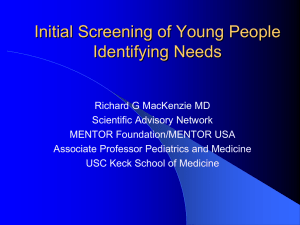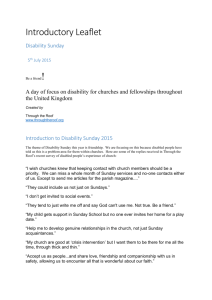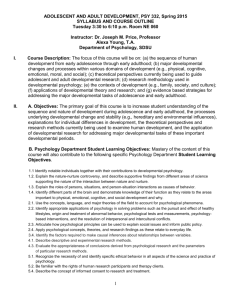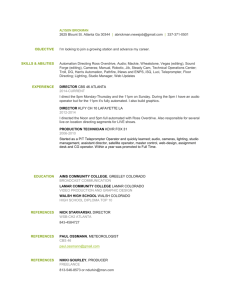EDUC-6368 Syllabus Spring 2015
advertisement
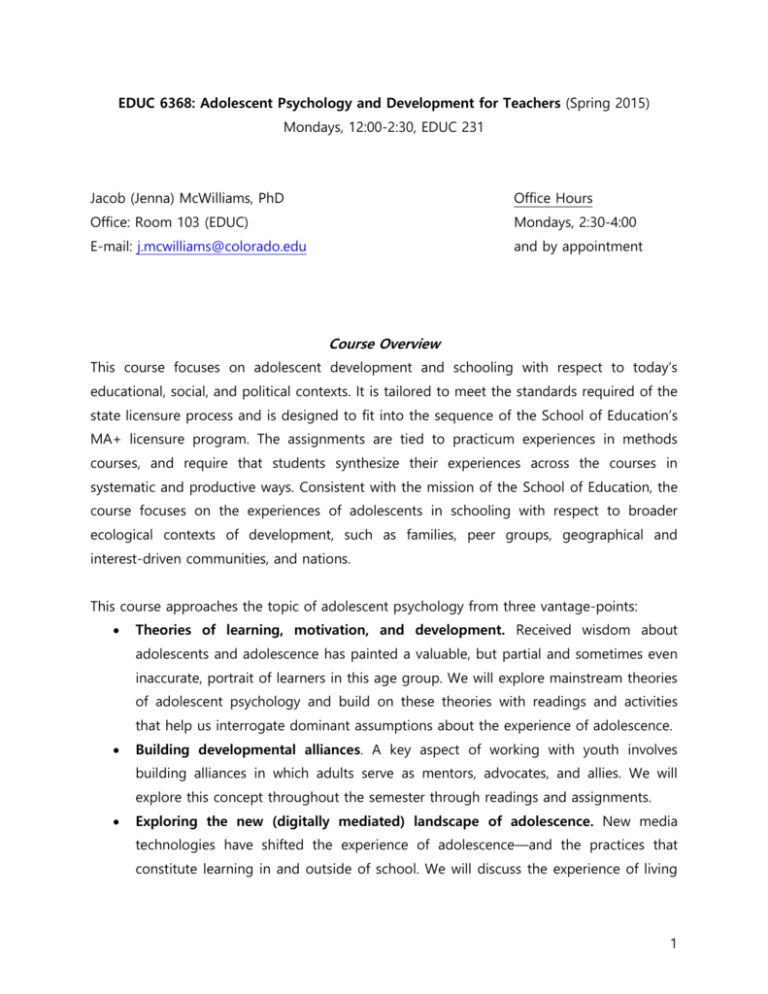
EDUC 6368: Adolescent Psychology and Development for Teachers (Spring 2015) Mondays, 12:00-2:30, EDUC 231 Jacob (Jenna) McWilliams, PhD Office Hours Office: Room 103 (EDUC) Mondays, 2:30-4:00 E-mail: j.mcwilliams@colorado.edu and by appointment Course Overview This course focuses on adolescent development and schooling with respect to today’s educational, social, and political contexts. It is tailored to meet the standards required of the state licensure process and is designed to fit into the sequence of the School of Education’s MA+ licensure program. The assignments are tied to practicum experiences in methods courses, and require that students synthesize their experiences across the courses in systematic and productive ways. Consistent with the mission of the School of Education, the course focuses on the experiences of adolescents in schooling with respect to broader ecological contexts of development, such as families, peer groups, geographical and interest-driven communities, and nations. This course approaches the topic of adolescent psychology from three vantage-points: Theories of learning, motivation, and development. Received wisdom about adolescents and adolescence has painted a valuable, but partial and sometimes even inaccurate, portrait of learners in this age group. We will explore mainstream theories of adolescent psychology and build on these theories with readings and activities that help us interrogate dominant assumptions about the experience of adolescence. Building developmental alliances. A key aspect of working with youth involves building alliances in which adults serve as mentors, advocates, and allies. We will explore this concept throughout the semester through readings and assignments. Exploring the new (digitally mediated) landscape of adolescence. New media technologies have shifted the experience of adolescence—and the practices that constitute learning in and outside of school. We will discuss the experience of living 1 and learning with new media, anchored in recent publications articulate key shifts in how we think about adolescence, adolescent development, and adolescent communities. Driving Questions 1. How do I build a developmental alliance with a young person? 2. How do I design a classroom or community space that engages and empowers young people? Big Ideas of this Syllabus This course focuses on three key issues related to adolescent psychology: theories of learning, motivation, and development; building developmental alliances with youth; and the role of new media technologies in learning and development. Readings for the class are available in D2L, and unless I notify you otherwise, all assignments will be submitted through D2L You’ll complete 3 major assignments for this course: An identity position statement, a digital storytelling project, and a portrait of an adolescent. Course goals Students in this course will… 1. Explore and draw on various theories of adolescent development in order to account for the lived experiences of groups of youth, social and cultural contexts, diversity and social justice 2. Build a developmental alliance with one or more adolescents, and use this alliance to reflect on their goals as teachers engaged in the work of social transformation in classrooms. 2 3. Develop an awareness of the role of new digital technologies in the academic, social, and emotional lives of adolescents. Course Assignments Assignment Deadline Personal position statement Points 15% Initial statement Sunday, 1/18, 5pm Revised statement Friday, 5/1, 5pm Digital storytelling assignment 25% Proposal Sunday, 2/1, 5pm Completed product Sunday, 2/15, 5pm Portrait of an Adolescent 40% 3 D2L posts about the process of forming a developmental 5% alliance Introductions Sun 2/8, 5pm Progress report Sun 3/8, 5pm Exiting the relationship Sun 4/5, 5pm Neighborhood walk Sunday, 3/1, 5pm 5% Observation notes Sunday, 4/12, 5pm 5% Interview notes Sunday, 4/26, 5pm 5% Case study Final Exam Week 20% Final oral exam TBA 10% Participation and additional assignments ongoing 10% Explanation of Assignments Personal position statement (15% of grade). At the beginning of the semester, you will respond to a series of prompts that invite you to locate yourself and your relationship to 3 teaching and learning and to think about your views on building a developmental alliance with youth, on diversity, and on the role of new media in learning. At the end of the semester, you will write a short paper that revisits what you wrote at the beginning of the course and identify how your thinking has changed, how it has remained the same, and how course readings and activities helped to support your views on these issues. Digital storytelling project (25% of grade). You’ll use digital technologies to tell a story of a developmental alliance that was important for your own growth or for the growth of a friend or family member. This project must include at least two modalities—text, audio, and visual (images/movie) formats. Portrait of an adolescent (40% of grade). This is the biggest assignment you’ll complete this semester. You will be required to form a developmental alliance with a student of a traditionally marginalized ethnic, linguistic, sexual, or gender group. Cross course final exam (10% of grade). At the end of the semester, you will participate in an oral final exam with classmates. Details on this will be announced later in the semester. Course Policies and Expectations Attendance: This class is designed around the assumption that students will need to be present in class in order to support their own and others’ learning. The best way to ensure your success in this class is to show up every day, on time, prepared to participate in discussions and activities. Every student in this course can make use of one free absence, no questions asked. Additional absences will result in a lowered grade in the course. Extra credit: If a worthwhile opportunity for extra credit arises, it will be offered to the entire class. Extra credit will not be offered on an individual basis. E-mail Response Policy: The University of Colorado Boulder considers email to be an official form of communication. All CU-affiliated faculty, staff, and students are expected to check and respond to e-mail on a frequent and consistent basis in order to stay current with university-related communications. For more information on CU’s email policy, see http://www.colorado.edu/policies/student-e-mail-policy. 4 I can be contacted via email at j.mcwilliams@colorado.edu, and you can expect a response within 24 hours except on weekends. Changes to the Syllabus: During the semester, changes may occur to the syllabus and will be posted in D2L. Students have the responsibility to accommodate all changes. Respect for Diversity: Diversity is accepted, encouraged, and valued in our classroom. Differences between individuals and opinions or backgrounds are viewed as learning experience. Language that degrades any individual or group because of gender, ethnicity, nationality, race, socioeconomic status, disability status, religious preference, or sexual orientation will not be tolerated. Expectations regarding written work Assignments must be turned in on time. Extensions may only be granted for extenuating circumstances, and only if requested one week ahead of the relevant deadline. Written work must be in Times New Roman, 12 point font, double-spaced, with 1 inch margins. Writing should observe APA guidelines (American Psychological Association, 6th Edition). This includes, for example, how references are cited (in the text and in reference section). The APA writing manual is available in the Education library. You can also find information at the following link: http://owl.english.purdue.edu/owl/resource/560/01/. Reasonable accommodation Disabilities: If you qualify for accommodations because of a disability, please submit to me a letter from Disability Services in a timely manner so that your needs may be addressed. Disability Services determines accommodations based on documented disabilities. Contact Disability Services at 303-492-8671 or by email at dsinfor@colorado.edu. The office of Disability Services is located in N200 Center for Community, http://www.colorado.edu/disabilityservices/. If you have a temporary medical condition or injury, see Temporary Medical Conditions: injuries, Surgeries, and Illnesses guidelines under Quick Links at Disability Services website and discuss your needs with me. 5 Observance of Religious Holidays and Absences from Classes or Examinations: Campus policy regarding religious observances requires that faculty make every effort to reasonably and fairly deal with all students who, because of religious obligations, have conflicts with scheduled examinations, assignments, or required attendance. In this class, I will make every effort to accommodate all students who have such conflicts with scheduled examinations, assignments, or attending class, provided you notify me well in advance of the scheduled conflict. Full details are available at http://www.colorado.edu/policies/fac_relig.html Classroom Behavior Policy: Students and faculty each have responsibility for maintaining an appropriate learning environment. Those who fail to adhere to such behavioral standards may be subject to discipline. Professional courtesy and sensitivity are especially important with respect to individuals and topics dealing with race, color, culture, religion, creed, politics, veteran’s status, sexual orientation, gender, gender identity and gender expression, age, disability, and nationalities. Class rosters are provided to the instructor with the student’s legal name. I will gladly honor your request to address you by an alternate name or gender pronoun. Please advise me of this preference early in the semester so that I may make appropriate changes to my records. See relevant policies at http://www.colorado.edu/classbehavior.html and at http://www.colorado.edu/studentaffairs/judicialaffairs/code.html#student_code Discrimination & Harassment The University of Colorado Boulder (CU-Boulder) is committed to maintaining a positive learning, working, and living environment. CU-Boulder will not tolerate acts of discrimination or harassment based upon Protected Classes or related retaliation against or by any employee or student. For purposes of this CU-Boulder policy, "Protected Classes" refers to race, color, national origin, sex, pregnancy, age, disability, creed, religion, sexual orientation, gender identity, gender expression, veteran status, political affiliation or political philosophy. Individuals who believe they have been discriminated against should contact the Office of Discrimination and Harassment (ODH) at 303-492-2127 or the Office of Student Conduct (OSC) at 303-492-5550. Information about the ODH, the above referenced policies, and the campus resources available to assist individuals regarding discrimination or harassment can be obtained at http://hr.colorado.edu/dh/ 6 Honor Code: All students of the University of Colorado at Boulder are responsible for knowing and adhering to the academic integrity policy of this institution. Violations of this policy may include: cheating, plagiarism, aid of academic dishonesty, fabrication, lying, bribery, and threatening behavior. All incidents of academic misconduct shall be reported to the Honor Code Council (honor@colorado.edu; 303-725-2273). Students who are found to be in violation of the academic integrity policy will be subject to both academic sanctions from the faculty member and non-academic sanctions (including but not limited to university probation, suspension, or expulsion). Other information on the Honor Code can be found at http://www.colorado.edu/policies/honor.html and at http://honorcode.colorado.edu 7 Course calendar Week Date Topic Readings Assignments due 1 1/12 Introduction to Engaging hooks, “Engaged Pedagogy” Personal positioning Day— pedagogy, Parmar & Sternberg, “Locating yourself for response due (via no locating our class selves course 2 MLK 1/19 your students” Nakkula & Toshalis, Ch.1, "The construction D2L, by 5 p.m. Sunday, 1/18) of adolescence” 3 1/26 Rethinking Lesko,“Denaturalizing Adolescence” adolescence Woo, “Age” Watch: Adichie, “The danger of a single story” (http://www.ted.com/talks/chimamanda_adichi e_the_danger_of_a_single_story/transcript?lan guage=en) 4 2/2 Engaging ethical fieldwork Paris, "A Friend Who Understand Fully": Notes Digital storytelling on Humanizing Research in a Multiethnic proposal due (by 5 Youth Community p.m. Sunday, 2/1) Merriam, “Being a careful observer” DeMeulenaire, “Toward a Pedagogy of Trust” 5 2/9 Adolescence in Ito et al., “Media ecologies” First D2L post on the age of new Mills, “Effects of Internet use on the forming a media adolescent brain” Sifferlin, “Why selfies matter” http://healthland.time.com/2013/09/06/why- developmental alliance due by 5 p.m. Sunday, 2/8 selfies-matter/ 6 2/16 Technology use, continued Forming a developmental alliance with youth Shirky, “Why I just asked my students to put their laptops away” Murphy, “How to use technology to make Digital storytelling product due (by 5 pm Sunday, 2/15) you smarter” Estes, “Google is making us stupid and smart at the same time? Willingham, “Why students don’t like school” 7 2/23 Space and place in adolescence Rhodes, “First do no harm: Ethical principles for youth mentoring relationships" 8 Barron, “Conceptualizing and Tracing Learning Pathways over Time and Setting” Barton, “Teaching science with homeless children: Pedagogy, representation, and identity” 8 3/2 Identity Nakkula & Toshalis, “identity in context” Neighborhood walk development Phelan,et al., "Students' Multiple Worlds" reflection due by 5 Nasir, N., "Studying identity in learning p.m. Sunday, 3/1 contexts from a human sciences perspective" Dutro, “Writing wounded” 9 3/9 Marginalized identities: Race & class Singleton & Hays, “Beginning courageous conversations about race” Second D2L post on forming a Finn, “A distinctly un-American idea” developmental Leonardo, “Pedagogy of fear: Toward a alliance due by 5 Fanonian theory of ‘safety’” p.m. Sunday, 3/8 Listen to This American Life episode, “no these things will not be on the test,” acts I and II: http://www.thisamericanlife.org/radioarchives/episode/474/back-to-school 19 3/16 Marginalized Pascoe, “Dude, you’re a fag” identities: Talburt, “Constructions of LGBT Youth: Gender and sexual identities Opening Up Subject Positions” Excerpt from Bornstein, “My Gender Workbook” 12 3/23 Spring break 11 3/30 Marginalized Solomon, ”Autism” Interview notes due identities: McDermott, “The acquisition of a child by a by 5 p.m. Sunday, Neuro-atypicality & neurodiversity learning disability” 3/22 Video: Sandmann-Hurley, “What is dyslexia?” http://blogs.kqed.org/mindshift/2014/09/what s-going-on-inside-a-dyslexic-students-brain/ 12 3/30 Spring break 13 4/6 Hybrid identities in classroom spaces Greeno & Hull, “identity and agency in nonschool and school worlds” 3rd D2L post on forming a Gutierréz et al, "Rethinking Hybridity" developmental McWilliams, “Lessons from a classroom alliance due by 5 participatory culture” p.m. Sunday, 4/5 9 14 4/13 Peer cultures, bullying, and empathy Eisenberg, “Emotion, regulation, and moral development” Meyer, “A feminist reframing of bullying and Observation notes due by 5 p.m. Sunday, 4/12 harassment: Transforming schools through critical pedagogy” 15 4/20 No class—field work 16 4/27 Motivation and Kohl, “I won’t learn from you” Interview due by 5 engagement Rogoff,et al., “Firsthand learning through p.m. Sunday, 4/26 intent participation” Nolen et al., “Motivation, Engagement & Identity” Revised personal position statement due by 5 p.m. Friday, 5/1 Final exam Final portrait of an week adolescent due 10
